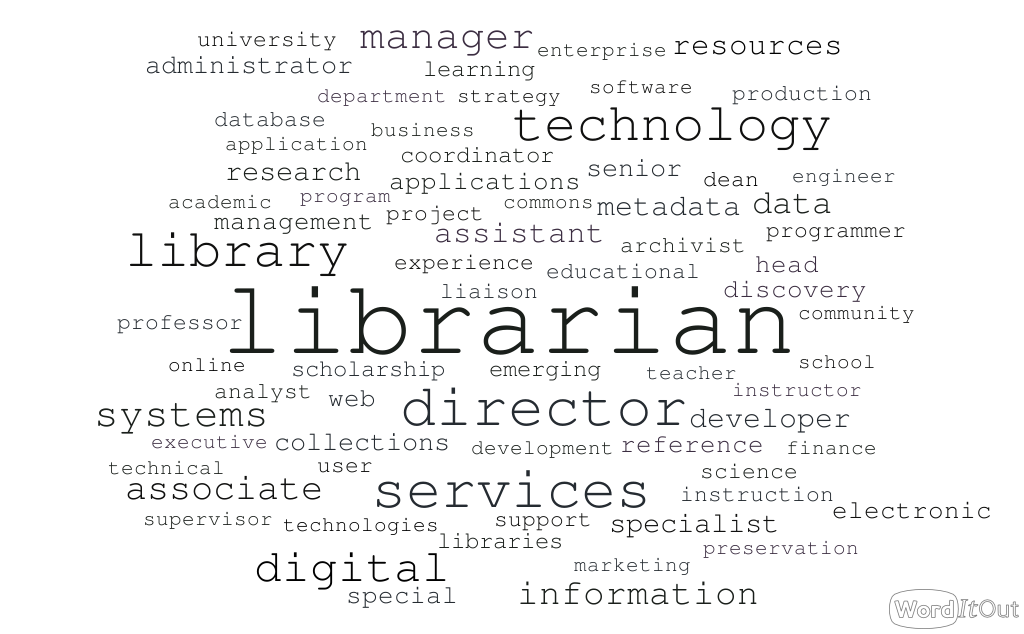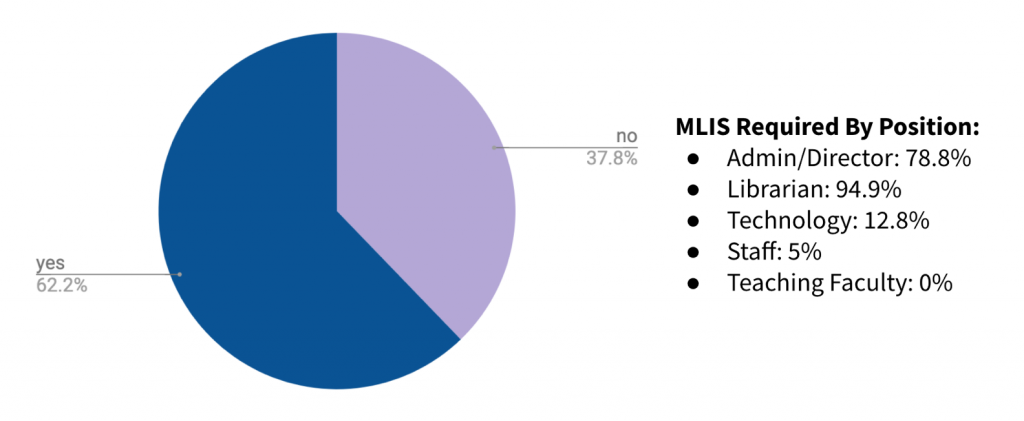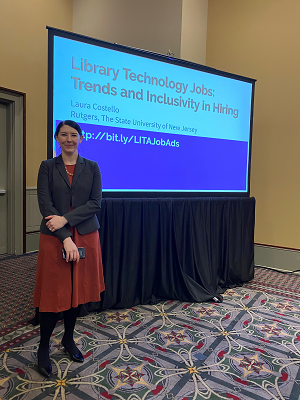Background & Data
This report comes from a joint analysis conducted by LITA’s Assessment & Research and Diversity & Inclusion committees in Fall 2019. The analysis focused on the new and emerging trends in skills in library technology jobs and the types of positions that are currently in demand. It also touches on trends in diversity and inclusion in job postings and best practices for writing job ads that attract a diverse and talented candidate pool.
The committees were provided with a list of 678 job postings from the LITA job board between 2015-2019. Data included the employer information, the position title, the location (city/state) the posting date. Some postings also included a short description. The Assessment & Research Committee augmented the dataset with job description, responsibilities, qualifications, and salary information for a 25% sample of the postings from each year using archival job posting information. Committee members also assigned metadata for the type of position and indicated the presence or absence of salary information in the posting.
Literature Review
The dataset analyzed for this project is aimed at job postings in library technology. There are several examples in the literature of job advertisement analyses that focus on library technology skills and the particular requirements and skillsets required for these types of positions. Despite the focus on technology skills, examples from the literature still show that a Master of Library and Information Science (MLIS) or equivalent degree is required between 79.3% and 90.1% of the time (Choi & Rasmussen, 2009; Triumph & Beile, 2015).
As in the sample examined in this study, many library jobs have a strong technology component. Triumph and Beile (2015) found that computer skills were explicitly stated and required in all but 17.2% of positions. Additionally, Choi & Rasmussen (2009) found that experience with digital library/digital information systems or services and web development/design experience were the most sought-after skills in academic library technology job postings from 1999-2007. An analysis of the jobs posted to Code4Lib from 2008-2018 (Gonzales, 2019) found changes in the technology skills required over that time period, including an increase in demand for Python, XML, and Java.
The presence of salary information in library job postings has also been examined in the literature. Triumph and Beile (2015) found that only 35.2% postings in their sample listed salary information. Silva and Galbraith (2018) found that women and librarians with less experience were less likely to engage in salary negotiation and recommend clarity in salary information in job postings for greater equity.
Job Trend Analysis
The LITA ARC examined several aspects of jobs posted to the LITA job board including information about the pool of employers and the type of employment sought. The committee also looked at the types of skills and qualifications sought in job postings and the presence of salary information. There were 395 unique employers in the dataset and 71% of these were unique. 11% of employers returned to post multiple jobs in the same year while 18% returned in different years to post jobs. In the sample of jobs coded by ARC (n=172), most of the postings were for librarian positions (45.6%) followed by library technology (22.7%), administrative or director (19.2%), staff (11.6%) and teaching faculty (0.6%). An analysis of job title keywords from the sample reflected this breakdown and revealed mostly simple descriptive job title language. A word cloud of the results below shows “librarian” in the top position. Terms like “library,” “technology,” “director,” “services,” and “digital” were also popular in job titles.

Figure 1: Word Cloud of Job Title Keywords
The sample was a mix of library and technology jobs, so the percentage of the jobs posted to the LITA job board that required an MLIS was lower than what was observed in the literature. Only 62.2% of jobs required an MLIS overall. The figure below shows a pie chart of the overall percentage and a breakdown of required MLIS by job type: 94.9% of the positions coded as librarian required the MLIS, 78.8% of admin/director positions, 12.8% of technology positions, and 5% of staff positions.

Figure 2: Pie Chart Showing Percentage of positions with MLIS Required
The ARC also examined 70 complete postings from 2019 to understand the trends in job posting language. A word count analysis was conducted on the full text of the job descriptions, skills and duties, and qualifications. Data was cleaned to combine similar terms and clarify usage of ambiguous terms. Though only 19% of the jobs in this sample were categorized as administrators or directors, leadership, management, and supervisory skills were the most frequently mentioned skills in 2019 (436 instances). Communication, collaboration, and teamwork skills were also highly sought after (328 instances) followed by planning and strategic skills (152 instances). Technology skills frequently mentioned included development (116 instances), general digital and technology skills (331 instances), and software/hardware administration and maintenance (176 instances). Sought after library skills included information/research (370 instances), reference (41 instances), data (115 instances), collections (120 instances), cataloging/metadata (79 instances), instruction/teaching (120 instances), and scholarship or scholarly communications (72 instances). In addition, these specific technology tool skills were frequently mentioned:
- Web, websites: 116 instances
- Discovery: 43 instances
- Databases: 32 instances
- Repository: 31 instances
- Statistics: 19 instances
- Server: 17 instances
- ILS: 13 instances
- Proxy: 13 instances
- Primo: 12 instances
- php: 12 instances
- Digitization: 12 instances
- Alma: 12 instances
- Python: 11 instances
- HathiTrust: 11 instances
Salary information was posted for 39% of the positions that had complete information (n=223). This percentage is higher than the figure found by Triumph and Beile in their 2015 analysis, which could mean a positive trend in salary posting information. The highest listed annual salary was $233,000 and the lowest listed was $33,880. The average salary range was $67,331-$89,282.
Diversity & Inclusion Best Practices
The Diversity & Inclusion Committee analyzed a sample of the augmented job posting information and developed several recommendations for position posting.
Recommendations for Job Descriptions:
- Use gender-neutral language (Hire for Talent)
- Ensure that job descriptions note ADA Compliance
- Include an Equal Employment Opportunity Statement (Equity, Diversity and Inclusion in Recruitment, Hiring and Retention)
- Seek clarity in postings by avoiding jargon (5 Must-Do’s for Writing Inclusive Job Descriptions)
- Avoid using boilerplate language in descriptions on job postings (To be more inclusive to people with disabilities, employers should start with their job descriptions)
Best Practices:
- Clearly post a salary or salary range for the position (4.2 How to Write an Inclusive Job Description)
- Include a value statement that highlights your institution’s commitment to hiring for diversity and inclusion (Equity, Diversity and Inclusion in Recruitment, Hiring and Retention)
- List inclusive benefits like parental leave, remote work, and education subsidies (5 Must-Do’s for Writing Inclusive Job Descriptions)
- Ensure that the application procedure is easy to follow (Can Your Job Posting Attract Diverse Candidates?)
Job Requirements:
- Regularly revise or rewrite job descriptions to ensure that job requirements are clear and focused on the results of an activity rather than standardized requirements (Hire for Talent)
- Avoid posting requirements that are nonessential and may disqualify candidates who are otherwise qualified for the position (Hire for Talent)
- Clearly indicate the physical working conditions and hours of work (Hire for Talent)
- Exclude educational requirements if they are not necessary for success in the position (Equity, Diversity and Inclusion in Recruitment, Hiring and Retention)
References
Choi, Y., & Rasmussen, E. (2009). What qualifications and skills are important for digital librarian positions in academic libraries? A job advertisement analysis. The Journal of Academic Librarianship, 35(5), 457-467. https://doi.org/10.1016/j.acalib.2009.06.003
Gonzales, B. M. (2019). Computer programming for librarians: A study of job postings for library technologists. Journal of Web Librarianship, 13(1), 20-36. https://doi.org/10.1080/19322909.2018.1534635
Mathews, J. M., & Pardue, H. (2009). The Presence of IT skill sets in librarian position announcements. College & Research Libraries, 70(3), 250-257. https://doi.org/10.5860/0700250
Silva, E., & Galbraith, Q. (2018). Salary negotiation patterns between women and men in academic libraries. College & Research Libraries, 79(3), 324. https://doi.org/10.5860/crl.79.3.324
Triumph, T. F., & Beile, P. M. (2015). The trending academic library job market: An analysis of library position announcements from 2011 with comparisons to 1996 and 1988. College & Research Libraries, 76(6), 716-739. https://doi.org/10.5860/crl.76.6.716
Yang, Q., Zhang, X., Du, X., Bielefield, A., & Liu, Y. (2016). Current market demand for core competencies of librarianship—A text mining study of American Library Association’s advertisements from 2009 through 2014. Applied Sciences, 6(2), 48. https://doi.org/10.3390/app6020048
Additional Resources
- Recruiting for Diversity maintained by ALA’s Office for Diversity, Literacy, and Outreach Services (ODLOS)
- Inclusion, Diversity, and Equity: Members of the Association of Research Libraries Employee Demographics and Director Perspectives Ithaka S+R Report
- Burns, D., & Fargo, H. (2019). “All I did was get this golden ticket”: Negative emotions, cruel optimisms, and the library job search. In The Library with the Lead Pipe. http://www.inthelibrarywiththeleadpipe.org/2019/golden-ticket/
- Kung, J. Y., Fraser, K. L., & Winn, D. (2020). Diversity Initiatives to Recruit and Retain Academic Librarians: A Systematic Review. College & Research Libraries, 81(1), 96.
